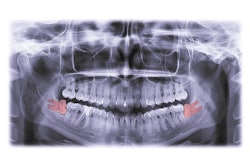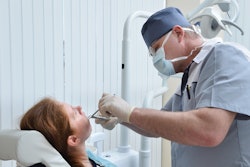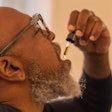Combining an oral magnesium supplement with nonsteroidal anti-inflammatory drugs (NSAIDs) may significantly reduce pain after third-molar surgery, according to a study recently published in Pain Research and Management.
Postoperatively, the oral magnesium supplement outperformed the placebo in controlling resting pain, the authors wrote.
"The addition of oral magnesium supplement as an analgesic adjuvant to NSAIDs significantly decreased pain intensity at rest 24 h following mandibular third molar (MTM) surgery," wrote the authors, led by Sutthipat Nimkulrat of the Chiang Mai University Faculty of Dentistry in Thailand (Pain Res Manag, January 23, 2025).
Magnesium is a known N-methyl-D-aspartate receptor blocker and has been studied for postoperative pain management. However, its analgesic effects in dentistry lack sufficient evidence. The study aimed to evaluate the efficacy of an oral magnesium supplement as an analgesic adjuvant for managing pain within 72 hours post-MTM surgery, they wrote.
The study included 25 adult patients who planned to remove both MTMs. Each patient underwent two surgeries at least four weeks apart. For each procedure, they were randomly assigned to receive either 400 mg of ibuprofen three times daily plus a 500 mg oral magnesium supplement or ibuprofen with a placebo for three days postsurgery.
Pain intensity at rest and during movement was primarily assessed at 24 hours, with additional evaluations at six, 48, and 72 hours. Researchers also recorded rescue analgesic use, time-to-first rescue dose, magnesium-related adverse events, and total analgesic consumption, they wrote.
The combination of ibuprofen and an oral magnesium supplement significantly reduced resting pain at 24 hours postoperatively compared to the placebo (estimated mean difference, -15.08; 95% confidence interval [CI], -29.01 to -1.14).
However, pain intensity at rest and during movement was similar between the groups at other time points, they wrote.
Additionally, rescue analgesic consumption and time-to-first rescue dose did not differ significantly between the groups. Ten participants (40%) in the magnesium group and 14 (56%) in the placebo group took rescue analgesics, with both groups showing similar total consumption and timing within 72 hours.
However, the study had limitations. Further research is needed to determine the effectiveness of different magnesium regimens and formulations in MTM surgery, the authors added.
"The key finding of this randomized controlled study is that oral magnesium supplement significantly decreased pain at rest at 24 h following MTM surgery in setting that ibuprofen was primary analgesic," they concluded.




















